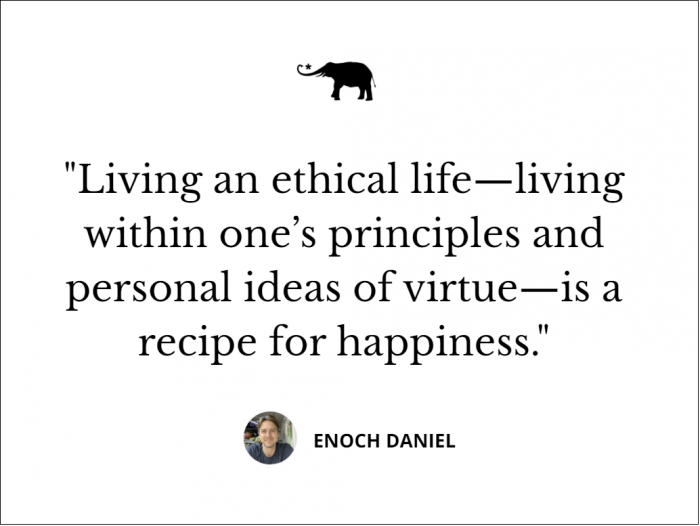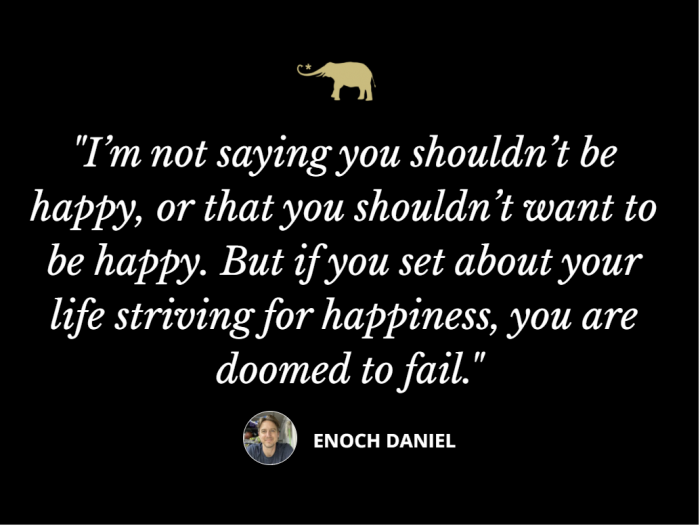~
I spent years avoiding Dan Harris’s book, 10% Happier, mostly out of spite.
I didn’t like the title. In some way, it offended me. What? You’re going to teach me to be happier? I call bullsh*t.
Now, I must admit that I eventually broke down and read the book. And it’s excellent.
The title doesn’t even reflect what I thought it meant. He’s just describing his own struggles as well as his journey into a mindfulness practice. In the end, he claims that his mindfulness practice has made him 10 percent happier in general. But my problem with that title really highlights a major philosophical framework in how I see the world.
You see, happiness is not the goal.
Why isn’t happiness the goal?
It does seem counterintuitive. Why wouldn’t I want to be happy? Isn’t happiness a worthy thing to strive for? Don’t we wish happiness for ourselves and for those around us?
And, yes, I fully admit that I want to be happy. I like being happy. Who doesn’t? But the problem lies in making happiness your goal. It’s like jumping right to dessert, or taking a shortcut in the middle of a race, or cutting to the chase without explaining what the hell the chase is all about.
Because if I make happiness my goal, I will take shortcuts. I can make myself happy for a little while, in limited circumstances. An orgasm makes me happy. A second piece of cake makes me happy. My third (or fourth) bourbon makes me happy. A long drag off a cigarette makes me happy. I’ve never done a line of coke off a hooker’s t*t, but there’s a part of me who thinks that would make me happy, too.
If happiness is the goal, these easy, fleeting sources of happiness can quickly become the means to achieve it. But what about a good workout? Or feeling satisfied with a job well done? Or basking in the love of my family? Those make us happy, too.
It’s true—they do. And you would be correct in arguing that those happy moments are purer and healthier than the ones I listed above. But we don’t go about those things with the goal of making ourselves happy. Happiness is a byproduct of doing something else that is good for us.
I’m not saying you shouldn’t be happy, or that you shouldn’t want to be happy. But if you set about your life striving for happiness, you are doomed to fail. At best, you become Kierkegaard’s aesthete, endlessly seeking pleasure without meaning. It’s a hedonistic and self-centered life. At worst, you end up taking those shortcuts to happiness mentioned above, just crawling through gutters looking for a dopamine hit.
So if happiness isn’t the goal, what should be? Well, there we have options. This is by no means an exhaustive list, but here you go.
Inner peace.
Mindfulness practices can have multiple benefits. That’s the whole point of Dan Harris’s book that I mentioned above. Numerous studies have shown how this can help. I won’t go into an exhaustive list here, but a quick Google search about the relationships between mindfulness and happiness can bring up dozens of published papers on the subject.
His Holiness the Dalai Lama talks a lot about happiness. Hell, he has a book called The Art of Happiness. You would be forgiven for thinking that Buddhism is about trying to be happy. But the Buddhist teaching isn’t really about finding happiness. It’s about finding equanimity.
“Equanimity is an even-minded mental state or dispositional tendency toward all experiences or objects, regardless of their affective valence (pleasant, unpleasant, or neutral) or source.” ~ Gaelle Desbordes, et al.
It is less about what many of us would consider happiness and is more about nonattachment and accepting what is. A strong case can be made that if we can accept the world as it is, then we will by default be happier. But again, happiness isn’t the goal. It’s a byproduct.
Excellence.
Getting really good at something is a great recipe for happiness. But we have to be careful here. We can’t just go into it searching for accolades, praise, or success. It has to be an exercise in feeling better within ourselves.
This can be a sport, a musical instrument, handiwork, gardening, our career, or any difficult endeavor. The key though is not to seek external validation. We have to actually take pleasure in what we’re doing—in the process.
In fact, I would argue that it’s not the achievement of excellence but the striving for it is where the real benefit lies.
Do it for the thing itself, not for any vain attempt at happiness.
But even more than these, happiness can be found in striving for excellence as a human being: in the attempt to live a virtuous life. Trying to be a good person is a recipe for “human flourishing” or as the Greeks philosophers called it eudaimonia.
Living an ethical life—living within one’s principles and personal ideas of virtue—is a recipe for happiness. It’s hard to be happy if you are consistently disappointed in yourself because you’re not living up to your own expectations. That’s why one of the taglines of my podcast is “10 percent less sh*tty.”
I’m not looking for happiness so much as I’m trying to be a better person. I want to be a better father, a better husband, a better human being.
Service.
One of the problems with seeking happiness as an end goal is that, by definition, it is a self-serving endeavor. It’s self-centered. That constant inward looking and thinking “how does this make me feel” can be poisonous.
“If you want happiness for an hour, take a nap. If you want happiness for a day, go fishing. If you want happiness for a year, inherit a fortune. If you want happiness for a lifetime, help somebody.” ~ Chinese proverb
One of the surest ways to feel better, to be happier, is to refocus and look outward. Think not about what we can do for ourselves, but what we can do for others. As hyper-social primates, we are hardwired for altruism. It is a built-in survival mechanism. Putting ourselves in a service mindset is natural to us as members of Homo sapiens and is another recipe for happiness.
Again, the science bears this out. An online search will find study after study after study that shows how volunteering and service to others can increase our own happiness and well-being. We can use this evolutionary inheritance to make the world and ourselves better.
Meaning.
Finally, I want to talk about meaning. This is something that I have thought a lot about. A few years ago, I hit a wall in my life. I was at the pinnacle of success professionally. I had a beautiful, healthy family. I had every material thing I could desire. Yet, I looked around and thought, “Is this it? What is it all about?”
Viktor Frankl called this “existential depression.” I had conquered the material world, or at least my little fief within it, but I felt empty, anchorless, and lost. Where was the meaning in my life?
“Ever more people today have the means to live, but no meaning to live for.” ~ Viktor Frankl
Frankl’s book, Man’s Search for Meaning should be required reading. It’s the story of his own travails in a Nazi death camp as well as an introduction to logotherapy, his own method of psychotherapy.
In the book, he makes the case that we must find meaning in our lives if we wish to have full human flourishing. In other words, if we want to be happy in our lives, we must have a purpose. That meaning or purpose can be found in many different things, even in suffering (as Frankl’s own story demonstrates). But there must be a reason for living. Without that reason, emptiness, sadness, hopelessness, and existential depression set in.
So am I happy?
This is a great question. I am, sometimes.
Do I want to be happy? Of course! Happiness is clearly better than sadness. And it is worlds better than depression, of which I’ve had my fair share.
But I’ve given up on happiness as a goal. It’s too fleeting. Too inwardly focused. And seeking happiness for itself leads to too many nasty shortcuts, at least for me.
Sometimes I’m sad or angry or full of shame. These things come and they go. But what I do know is that when I’m more at peace in my own mind, when I’m striving to be an excellent human being, when I’m serving others more than myself, and, most importantly, when I feel like my existence has some meaning, then yeah—I’m pretty happy. And that’s alright.













Read 6 comments and reply